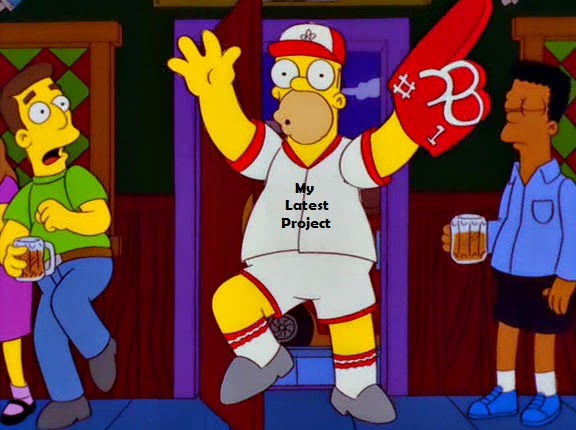But this blog fears no such consequences, largely because the stats indicate that no one is reading it (only a small exaggeration with the exception of, for some reason, my juvenile post about theater people promoting their projects featuring Homer Simpson gifs ... woohoo?). So let's dive in, shall we?
[P]renups are to marriage as condoms are to sex: sure, they're a good idea, but they're a real mood-killer.
Recently, a lawyer friend of mine posted on Facebook a lighthearted, but timely, warning to think twice about using the holidays as a time to propose. One of the several reasons he cited, in true lawyer fashion, was a perfectly valid point that giving an engagement ring as a Christmas gift undermines the ability to recover the ring should the engagement be later called off. This is a somewhat interesting topic itself and is well explained here.
I gave a similarly lighthearted response opining that maybe the newly-minted fiancée, in her holiday and engagement-induced euphoria, wouldn't mind signing a brief statement of understanding that the ring is given on the express condition of the occurrence of marriage. After a few more tongue-in-cheek riffs on the romance of legally-binding agreements, the OP's fiancée responds, in an unfortunately serious and somewhat stereotypical manner:
 |
Many of Future Mrs. OP's friends quickly agreed, and, of course, so did Mr. OP (he's not an idiot). The subject quickly turned to the mutual disdain of prenuptial agreements for essential the same reason. Though a bit eye-roll-inducing, I am thankful for her post, because it means I don't have to invent a straw man, er, straw woman, upon which to base this
Women, speaking in generalities, and even many men find the concept of prenups and conditional gifts entirely unromantic and contrary to the very essence of marriage, which according to modern social mores is supposed to be an unqualified and unconditional expression of love and devotion. As such, any contemplation of the possibility that it just might not work out is utterly taboo. A contract? Ugh. Lawyers? R.I.P. any chance at post-engagement coitus.
But this is really not that much different from anyone contemplating a major legal event, such as purchasing a business or forming a partnership. At the beginning, the relationship is all smiles and firm handshakes as the parties are excited about the deal. After all, why would you form a partnership with someone you didn't trust?
But you would, of course, be an idiot to rely solely on trust in such a situation. If you had any sense at all, you would sit down -- with each other at least but hopefully with a lawyer -- and write down the ground rules of such an arrangement. You do this because, while you are (hopefully) wildly optimistic the deal will succeed, you know that circumstances change, people change, excitement gives way to skepticism, and you might need an exit strategy. Call it being cynical if you will, but I call it pragmatism. And, I don't know about you, but it's a trait I find attractive, at least in moderation.
So why doesn't the same concept translate to marriage? I would guess that, to a lot of people, prenups are to marriage as condoms are to sex: sure, they're a good idea, but they're a real mood-killer. But also, I suspect most people fail to conceptualize marriage as itself a contract, with built-in terms and conditions and hefty penalties for the unwary. The law has a decidedly unromantic (and pretty archaic) understanding of marriage as an economic arrangement, in which two people merge into a single economic entity: sharing income, property, and expenses (some exceptions apply, of course). If that arrangement should end, the assets are divided accordingly -- that is, (for the most part) equally.
This "equitable" distribution can lead to some wildly inequitable results. Suppose a couple has no children, one partner works hard in a lucrative position (a medical doctor perhaps), while the other decides he is free to pursue a career less dependent on economic remuneration, like, say, blogging. Is it fair that, if the marriage ends, that he should get half of the big house in the suburbs and the nest egg that are almost solely the results of her hard work? Wasn't his freedom to pursue his own career goals, at least for a time, reward enough? Let alone that, in some jurisdictions and under some circumstances, she could be on the hook for spousal support, aka maintenance or alimony.
Modify that scenario to one where the bread winner spouse-to-be brings in children from a previous marriage. Certainly, the non-biologically related spouse will provide some support in raising those children, which undoubtedly has economic value, but what about when the marriage ends? The kids will (presumably) be going to live with the biological parent, meaning her expenses will rise while the step-parent's responsibilities will cease. Is it proper that the step-parent take half the house and assets from a the ex-spouse that is left to continue supporting her children, and all that entails (college -- eek).
This is exactly why this stuff needs to be sorted out ahead of time, romantic or not. It's not a matter of whether you are going to enter in a marriage contract; it's a matter of whether you are going to dictate the terms and conditions of that contract or accept the default terms when you say "I do."













